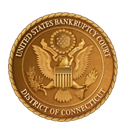You may represent yourself in your bankruptcy case. When you do not have an attorney, you are proceeding "pro se." You may be referred to as a "pro se filer/litigant" or a "self-represented filer/litigant." "Pro se" is a Latin term meaning "on one's own behalf." The right to proceed pro se in a civil case in federal court is provided by federal statute, 28 U.S.C. § 1654. Thus, any individual can proceed pro se. However, corporations and partnerships, may not proceed pro se and must be represented by an attorney. See, D. Conn. Bankr. L. R. 1002-1.
Filing for bankruptcy is an important decision. You should learn about bankruptcy to determine if filing is right for you. There are a number of resources available under the Understanding Bankruptcy tab to learn more.
If you choose to proceed without a lawyer, it is important that you familiarize yourself with the following statutes and rules before you file your bankruptcy case.
- The U.S. Bankruptcy Code, located at 11 U.S.C. §§ 101-1532 ("Bankruptcy Code"),
- The Federal Rules of Civil Procedure,
- The Federal Rules of Bankruptcy Procedure,
- The Local Rules of the U.S. District Court for the District of Connecticut,
- The Local Rules of Bankruptcy Procedure for the U.S. Bankruptcy Court for the District of Connecticut.
Additionally, you should review the Petition Forms for Individuals and Instructions on Bankruptcy Forms for Individuals and the Instructions for Paying the Bankruptcy Case (Petition) Filing Fee for Self-Represented Debtors.
If you have filed a voluntary petition under Chapter 7, 11, 12, or 13 of the Bankruptcy Code, you must:
- attend the scheduled Meeting of Creditors as required by § 341 of the Bankruptcy Code;
- comply with §§ 521 through 528 of the Bankruptcy Code; and
- comply with § 1107 if the case is commenced under Chapter 11, with § 1203 if the case is commenced under Chapter 12, or comply with § 1303 if the case is commenced under Chapter 13.
Warning:
The information on this website is specifically for individuals who are representing themselves in the U.S. Bankruptcy Court for the District of Connecticut without the assistance of an attorney.
This page is intended as an informative resource for understanding the basic procedures of this Court. The information is not a substitute for legal advice from an experienced attorney. Bankruptcy law can be complicated, and debtors should, if possible, obtain information/advice from an attorney or a legal aid service experienced in bankruptcy law.
The statements on this webpage do not constitute legal advice and may not be cited as legal authority. The information on this webpage does not replace the U.S. Bankruptcy Code, 11 U.S.C. §§ 101-1532, the Federal Rules of Civil Procedure, the Federal Rules of Evidence, the Federal Rules of Bankruptcy Procedure, the Local Rules of the U.S. District Court for the District of Connecticut, the Local Rules of Bankruptcy Procedure for the U.S. Bankruptcy Court for the District of Connecticut, or the individual practices of the judges of this Court.
All parties filing without an attorney/acting as a Pro Se Filer/Litigant are responsible for complying with all applicable rules of procedure. If there is any conflict between the information on this webpage and the applicable rules, the rules govern, including this Court's Contested Matter Procedure in D. Conn. Bankr. L.R. 9014-1.
This webpage may contain links to other websites. These links are provided for your convenience. By linking to the websites of other organizations, the Court is neither endorsing those organizations nor making any representation about the quality of the service provided by those organizations. The U.S. Bankruptcy Court for the District of Connecticut cannot guarantee the accuracy, relevance, reliability, or completeness of the information you may find on other websites.
